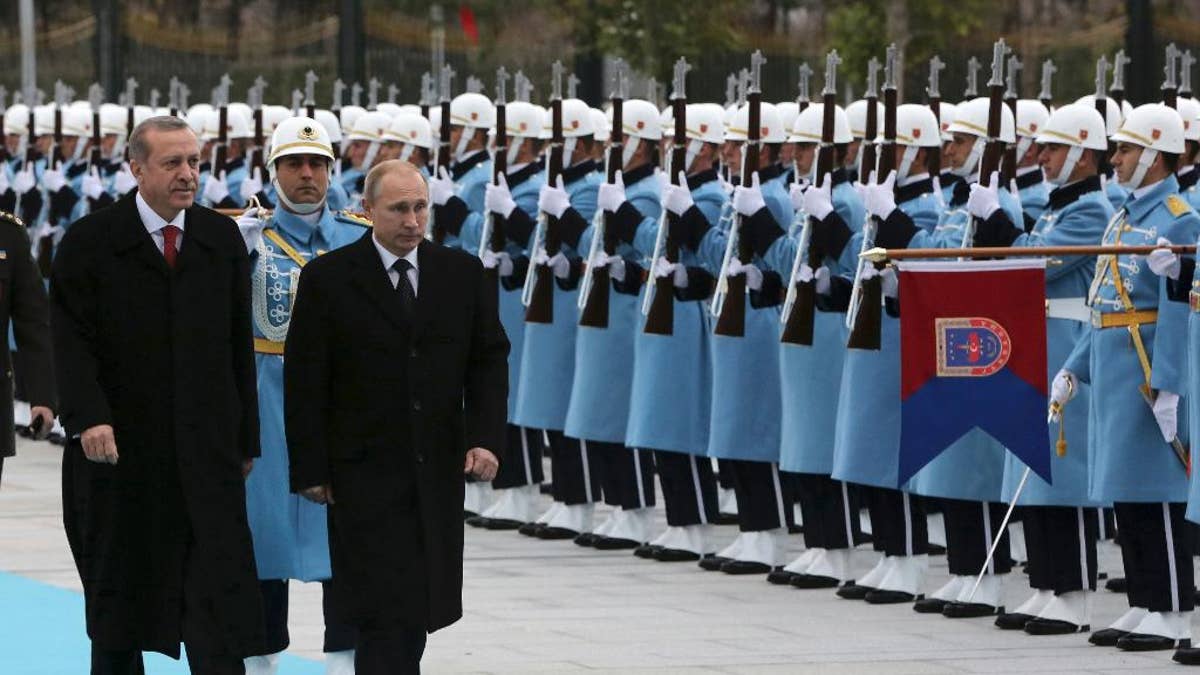
Russian President Vladimir Putin, right, and his Turkish counterpart Recep Tayyip Erdogan meeting in Ankara in 2014. (AP Photo/Burhan Ozbilici, File)
Turkish President Recep Tayyip Erdogan is set to travel to Russia next month to meet with Russian President Vladimir Putin — the first meeting between the two leaders since tensions ratcheted up over the downing of a Russian fighter jet last year, Turkey's deputy prime minister announced.
Mehmet Simsek said Tuesday that Erdogan and Putin would meet in St. Petersburg on Aug. 9, Turkey's state-run Anadolu news agency reported.
Putin had denounced the downing of the Russian warplane at the Syrian border on Nov. 24 as a "treacherous stab in the back." Russia rejected the Turkish claim that the plane had violated its airspace, and responded by deploying long-range air defense missiles to its base in Syria, warning that they would destroy any target posing a threat to Russian aircraft.
Erdogan sent a letter to Putin in late June, writing that he shared the pain of the killed pilot's family "with all my heart," according to the Kremlin. "We are ready to take any incentive to help ease the pain and the burden of inflicted damage."
Erdogan's office was keen to describe the letter as an expression of regret, not an apology.
"In the letter, the president stated that he would like to inform the family of the deceased Russian pilot that I share their pain and to offer my condolences to them. May they excuse us," spokesman Ibrahim Kalin said.
Since then, the two countries have moved to normalize relations, restoring anti-terror cooperation and military contacts and lifting Russian restrictions on tourism to Turkey.
The plane's downing came amid a rift between Moscow and Ankara over Syria, where they backed the opposing sides in the conflict.
Moscow moved swiftly to ban the sales of package tours to Turkey, which had depended heavily on the Russian tourist flow; banned most of Turkey's food exports; and introduced restrictions against Turkish construction companies, which had won a sizable niche of the Russian market.
Erdogan, who often has been compared to Putin because of both leaders' intolerance to dissent and biting criticism of the West, had apparently miscalculated the plane incident's fallout for the Turkish economy.
The letter came at a moment when Ankara's relations with the EU and the U.S. were strained over the refugee crisis, human rights issues and other disputes.
Turkey's new prime minister, Binali Yildirim, said recently that Turkey wants to increase the number of its friends and decrease the number of its enemies, and the letter came on the same day that Turkey and Israel released details of a deal to reappoint ambassadors and end six years of acrimony over Israel's 2010 deadly raid on a Gaza-bound Turkish aid ship.
The Associated Press contributed to this report.
